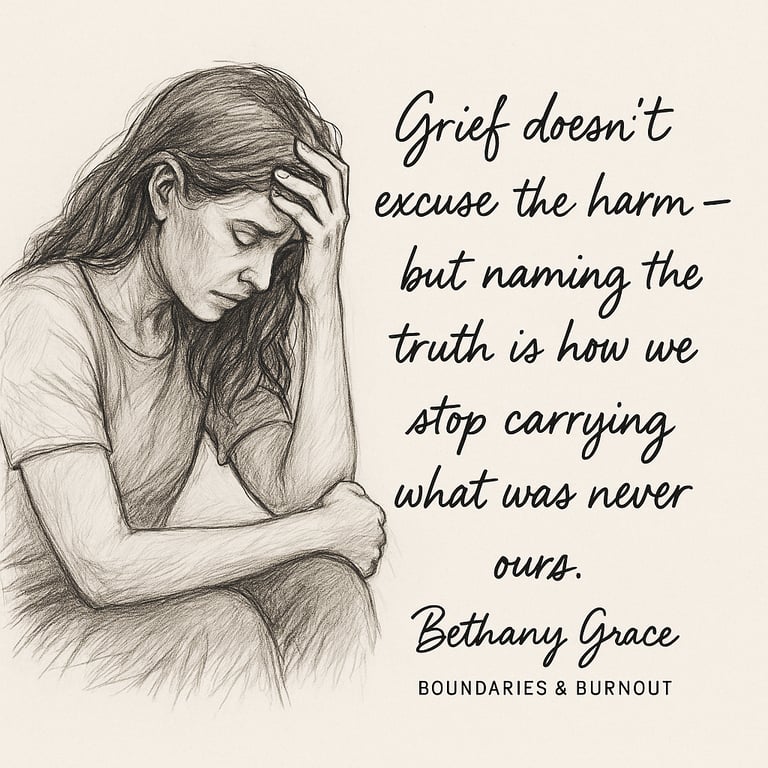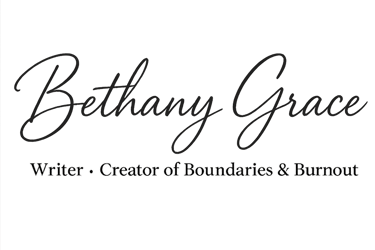When Grief Turns a Parent Into Someone You Can’t Recognize
A reflection on loss, trauma, and the long road back to understanding.
GRIEFFAMILY HISTORYBREAKING GENERATIONAL TRAUMA
Bethany Grace
11/16/20254 min read
Sometimes a song puts words to the parts of our story we didn’t know how to name.
If you want the full emotional arc of this reflection, I invite you to listen to “Older” while you read.
It captures the ache, the clarity, and the complicated softness of finally understanding the parent who couldn’t show up the way we needed them to.



The Day Our Family Fractured
When my father passed, the world didn’t just tilt — it cracked open in a way none of us were prepared for.
Everyone grieves differently, but some grief becomes something heavier, sharper, and harder to name.
For a long time, I thought what followed was just the messiness of mourning.
Just a hard season.
Just “life after tragedy.”
But the truth is: that moment didn’t break just one person.
It broke all of us.
And it changed the entire shape of our home.
When Pain Isn’t Processed, It Gets Passed Down
My mother didn’t know what to do with the pain she was drowning in.
She didn’t ask for help.
She didn’t reach for support.
She didn’t let anyone see how deeply she was unraveling.
And so that pain spilled outward.
Not in tears.
Not in therapy.
But as anger.
My sister, my stepfather, and I became the place where that anger landed.
Mentally.
Emotionally.
Physically.
Children shouldn’t be the outlet for a parent’s grief.
But when someone refuses to face their pain, someone else ends up carrying it.
And that “someone else” was us.
The Years I Spent Hating Her
I don’t say that lightly.
I don’t say it with pride.
I say it because it’s the truth.
For years, I hated my mother.
Not because she was grieving — but because her grief became the storm I had to survive.
Because her pain became our punishment.
Because her instability became our childhood.
It shaped the way I walked through the world.
It shaped the way I connected with people.
It shaped the walls I built around myself.
And as an adult, the distance didn’t go away.
If anything, it grew.
Trying to reconnect with someone who hurt you — even unintentionally — is a different kind of grief all on its own.
The Hardest Realization of My Healing Journey
It took years of reflection and unlearning for me to finally understand this:
My mother’s abuse was the shape her unprocessed grief took.
Her refusing help didn’t make her strong.
It made her dangerous in ways she didn’t recognize.
Her silence became our burden.
Her sadness became our fear.
Her avoidance became our responsibility.
This doesn’t excuse the harm.
It doesn’t erase the trauma.
It doesn’t make it “okay.”
But it explains a pattern that my younger self couldn’t understand.
When someone won’t face their pain, it has to go somewhere.
And in my family, it went into us.
The Shift That Changed Everything
This part is important — because healing isn’t always a one-direction story.
Recently, my mother finally did something she needed to do decades ago:
She asked for help.
She got on antidepressant medication.
She started acknowledging the weight she was carrying.
She stepped out of denial and into accountability — at least for herself, even if not fully with us yet.
And I felt something soften inside me.
Not erase — soften.
Because growth in a parent, especially this late in life, is its own kind of miracle.
I’m proud of her.
Not because the past disappears,
but because she’s finally choosing to stop living inside it.
What I Want My Readers to Hear
This reflection isn’t about blaming a parent.
It’s not about rewriting history.
It’s not about casting anyone as a villain.
It’s about naming the truth:
Grief doesn’t excuse abuse,
but understanding its roots can help us break the cycle instead of repeating it.
It’s about seeing the humanity in the people who hurt us
without erasing the harm they caused.
It’s about honoring the child I used to be
and the mother I am now
without letting either of them silence the other.
It’s about recognizing that sometimes healing comes from two places at once:
your own courage to face the past,
and the other person’s willingness to finally face themselves.
The Beginning of Something New
I don’t know what the future holds with my mother.
I’m still learning how to have a relationship with someone I spent years bracing against.
But for the first time, it feels possible.
Not because everything is fixed,
but because healing has finally begun —
on both sides.
And maybe that’s enough for now.


Lets Reflect:
Sometimes the hardest part of healing is slowing down long enough to hear what your own story is trying to tell you.
These questions aren’t here to judge you or reopen wounds — they’re here to give you a moment to breathe, acknowledge what surfaced, and gently explore what it means for your own journey.
Take what resonates. Leave what doesn’t.
This space is yours.
For Those Who Grew Up With a Hurting or Overwhelmed Parent:
Growing up around someone who was carrying more pain than they could hold leaves marks that take years to understand.
These questions are meant to help you explore your own experiences with curiosity, not blame — and to name the weight you were never meant to carry.
Reflection Questions
What part of my childhood still impacts how I show up in my relationships today?
What was I forced to carry that was never mine to hold?
What boundary or truth have I been afraid to speak out loud?
For Parents Who Are Ready to Heal, Repair, or Grow
Parenting doesn’t come with a guidebook for grief, trauma, or emotional survival.
These questions are not about shame — they’re about courage, self-reflection, and choosing a different path forward, even if it’s one small step at a time.
Reflection Questions
What pain or grief was I avoiding that spilled onto the people I loved?
What do I need to take responsibility for, without excuses or minimizing?
What step toward healing — therapy, medication, honesty, accountability — have I avoided but know I need?
This was a hard piece to write, but healing is often found in the places we’ve avoided the longest.
If this reflection met you where you are, I’m grateful.
Here, in this space, we tell the truth —
not to stay stuck in it,
but to finally let it go.
Thank you for reading.
Thank you for seeing me.
And thank you for doing the work alongside me.


